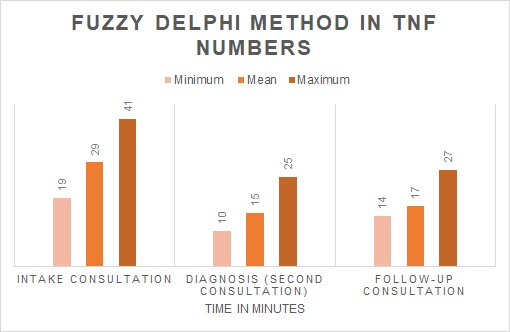Session Information
Date: Monday, November 8, 2021
Title: Health Services Research Poster II: Care Models and Innovation (1061–1082)
Session Type: Poster Session C
Session Time: 8:30AM-10:30AM
Background/Purpose: Transparency and management of healthcare costs is warranted for rheumatoid arthritis (RA) as the disease places a great economic burden on a patient and societal level. Time-Driven Activity Based Costing (TDABC) is a cost accounting method that may support value-based healthcare (VBHC) management programs. A flaw of TDABC is the inaccuracy of the time estimates due to heterogeneity in patients’ care needs, presence of (multi)morbidity and the variety of providers. Thus, we aimed to gain knowledge in the costs of the RA care cycle and improve the accuracy of the cost estimates with the fuzzy logic method.
Methods: The data was retrieved from the outpatient department of rheumatology at Maasstad hospital. The care delivery value chain (CDVC) and the corresponding process map serves as a base for the assessment of the costs of the RA care cycle. To correct for the imprecision and ambiguity of the parameters in the TDABC model, the fuzzy logic Delphi method was applied and expressed in triangular fuzzy numbers (TNF). The average TNF numbers were obtained by focus groups and surveys for consultations with the medical team; rheumatologists, nurse practitioners, physician assistants, rheumatology nurses and doctor’s assistants. Minimum, average and maximum time estimates were compared to the standard time frames of the procedures and finally, utilized to calculate the total costs of the RA care cycle.
Results: Conducting the Delphi method gave insight in the time estimations of staff members. With respect to the rheumatologists, a distinction was made between the intake, diagnosis and the follow-up consultations. Graph 1 shows the results of the fuzzy Delphi method concerning the average estimates of the rheumatologists. With respect to the first consultation, the estimates of the physicians were considerably lower compared to the standard determined value of 50 minutes. The highest estimate, namely 45 minutes for the maximum TNF, is not even close to the standard time for the intake consult. Remarkable is the fact that the diagnosis consult is valued at 25 minutes regarding the maximum time needed. No distinction is made between the diagnosis and follow-up consult with respect to the standard time values, despite the fact that the time of the diagnosis consultation is significantly lower compared to the follow-up consultations (i.e. 40 minutes). The spread concerning time estimates are on average lowest for the follow-up consultations.
Conclusion: Fuzzy logic was combined with TDABC to encounter the deficiencies related to the TDABC methodology. To provide an accurate and precise estimate of the costs concerning the RA care cycle, time estimates of the complex and expensive procedures are calculated as TNF numbers. The results will depict the resource costs of the RA care cycle in three ways, namely the minimum costs of the care cycle, the mean costs and the maximum costs. Hence, the fuzzy logic estimates reflect reality more properly. As TDABC is still in its infancy, this research contributes to the investigation of a convenient cost accounting method concerning care cycles.
 Graph 1. Results of fuzzy Delphi method displayed in TNF numbers
Graph 1. Results of fuzzy Delphi method displayed in TNF numbers
To cite this abstract in AMA style:
Koster F, Lopes Barreto D, Kok M, Weel-Koenders A. Combining Fuzzy Logic with Time-Driven Activity Based Costing Within the Rheumatoid Arthritis Care Cycle: Insights from a Dutch Hospital [abstract]. Arthritis Rheumatol. 2021; 73 (suppl 9). https://acrabstracts.org/abstract/combining-fuzzy-logic-with-time-driven-activity-based-costing-within-the-rheumatoid-arthritis-care-cycle-insights-from-a-dutch-hospital/. Accessed .« Back to ACR Convergence 2021
ACR Meeting Abstracts - https://acrabstracts.org/abstract/combining-fuzzy-logic-with-time-driven-activity-based-costing-within-the-rheumatoid-arthritis-care-cycle-insights-from-a-dutch-hospital/
